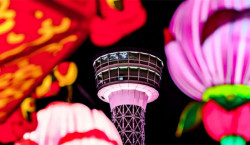
Originally published on metropolis.co.jp on June 2012

When I originally heard about the March 11 disaster I was living in Vancouver. For the first few days, somewhat guiltily, I brushed the news reports aside. Japan was notorious for earthquakes and to hear of one more among many, no immediate concerns were raised in my mind. It happened almost continuously after all. The media at that time was being particularly vague, both Western stations with their lack of immediate information, and the Asian stations as they tried to allay concerns.
However after a few weeks, more reliable reports were coming in as the world began to take notice. People’s wellbeing and the economy became a major concern. Almost every channel broadcast the news everywhere; my mental compass began to turn as I tried to learn more.
I could no longer ignore the call to aid ringing so soundly in my head each time I heard of a new development in Tohoku. I made my mind up.
Calling out to friends and family, I gathered what I needed and bought a ticket to Japan within the space of a few weeks. My worldly belongings were already condensed into two bags from years of country-hopping, so picking up and leaving had no weighty repercussions for me.
After signing up with one of the NPOs on the ground—in this case All Hands Disaster Relief—I was in the dirt and the debris 24 hours after touching down at Narita. I was shoveling mud, picking up concrete, cleaning photographs and fixing people’s homes six days a week almost consistently for five months. It was tough but morally rewarding work.
The overwhelming generosity, welcoming nature and kindness of the people of Ofunato City, Iwate Prefecture, filled the time spent there with life-changing, profoundly significant moments—ones impossible to forget.
The people of Tohoku as a whole took the tragedy that had befallen them and stood up even stronger than before. It wasn’t so much that we were there helping them, but rather that we were aiding a courageous and proud spirit return their towns to what they used to be. I intend to go again this summer, not just to volunteer, but to see this strength and resolve and the steady progress that has been made.
Yet there is still much work to be done. Unfortunately, many people have now stopped talking about the disasters and many reporters have stopped investigating the story. Just before this year’s Golden Week, I asked many people what they had planned for their week-long vacation. Most informed me they didn’t intend to do much at all. In itself this isn’t a bad thing; everyone should enjoy their much-earned break. But it was a different story last year.
During Golden Week in May 2011, many had a different priority during their free time. An army of students and salarymen took to Tohoku to aid in the disaster-stricken towns along the north-eastern coast.
In the case of Tohoku’s disaster recovery, the saying “No news is good news” is not entirely accurate. Predictions stated that Ofunato City, for example, would take some ten years to fully recover, while places like Kessenuma remain mostly untouched to this day.
The people of Tohoku still welcome any time, and any kind of help, that volunteers are willing to provide. The greatest thing I learned when volunteering is that many hands do, in fact, make light work. All that is needed is the willingness to do it. And after almost five months of volunteering I can attest first hand to the safety of helping in the northern prefectures.
If you have some desire to help and the will to follow through, foster this urge and take the time to do it. Now the spotlight is off the region, and the rush of pleasure people felt in helping might not be as strong. But that makes it doubly worthwhile to invest your time, even a year on. We each have something we can give to others, a commodity that is each person’s alone to give: our time, effort, and care.
The northeastern prefectures still have a long way to go, but with constant aid and a regular, steady stream of reliable information, natives and foreigners can still help Tohoku and its people build a new life for themselves.
Have something to say about this story? Share your comments below.







